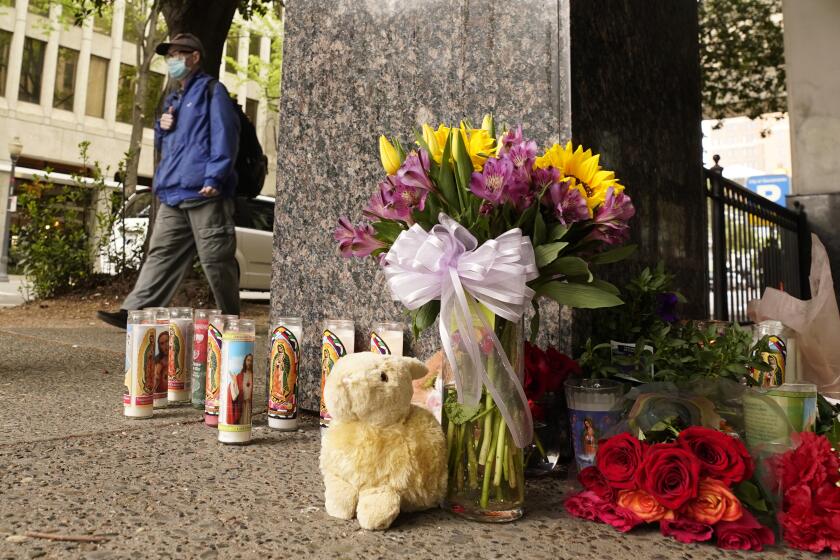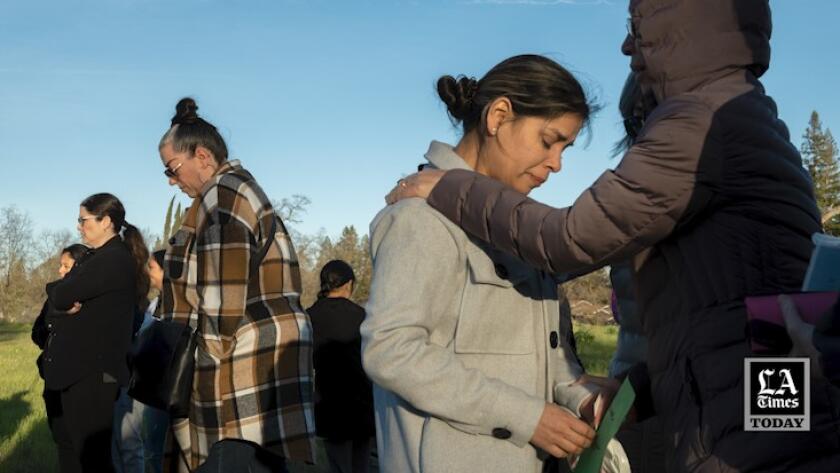A father shot his daughters. A mom wants to know why her warning was ignored
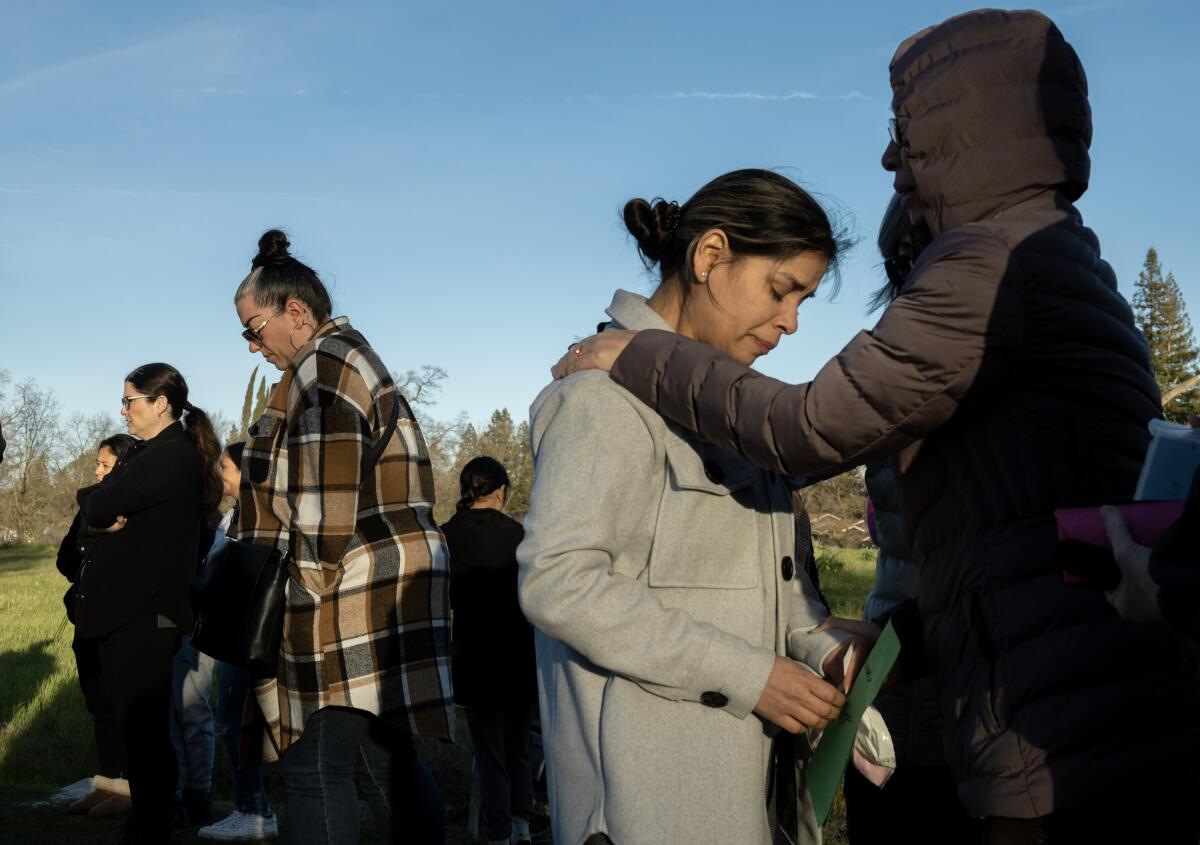
- Share via
CITRUS HEIGHTS, Calif. — The three little graves are covered in artificial turf, bright green on a cold winter evening.
The gravestones are hand-painted in swirls of purple and a darker green, with cloth butterflies centered above the names: Samarah, 9; Samantha, 10; and Samia, 13.
Three little butterflies dead and buried, shot by their father, David Mora, with a homemade “ghost gun” one year ago.
Their mother, Ileana Gutiérrez, stands behind those graves. Her body is rigid with grief until the pain breaks free of her control. Then, it consumes her and everyone around her, a palpable force like the night wind whirling around us, impossible not to feel.
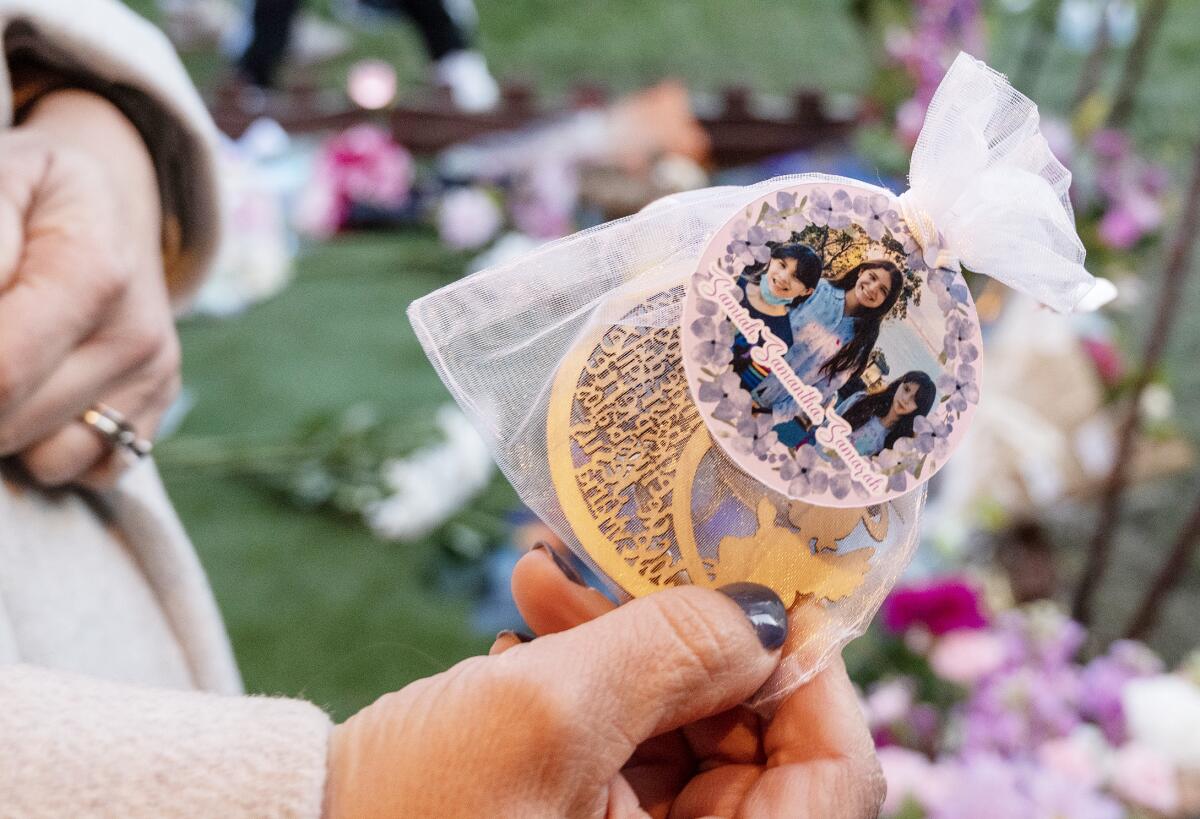
Gutiérrez invited me to this memorial service in a suburb of Sacramento because she is tormented not just by her unfathomable loss, but also by the knowledge that those who were charged with helping her instead failed her with this horrible and unforgivable consequence — that her children were left unprotected from a man she knew was dangerous.
“The principal person who did this is no longer here, but many people didn’t do their job well,” she told me at her kitchen table the day after the service. “I just want people to take it seriously — a mental health problem, domestic violence, the protection of kids, and that people can get guns so quickly and so easily.”
She doesn’t want your pity. She wants you to feel her anger. She wants you to not let it happen again.
And yet, her lost family has become another statistic with no accountability. She is just one more victim of domestic violence whose warnings were ignored, her voice further muted by her undocumented status.
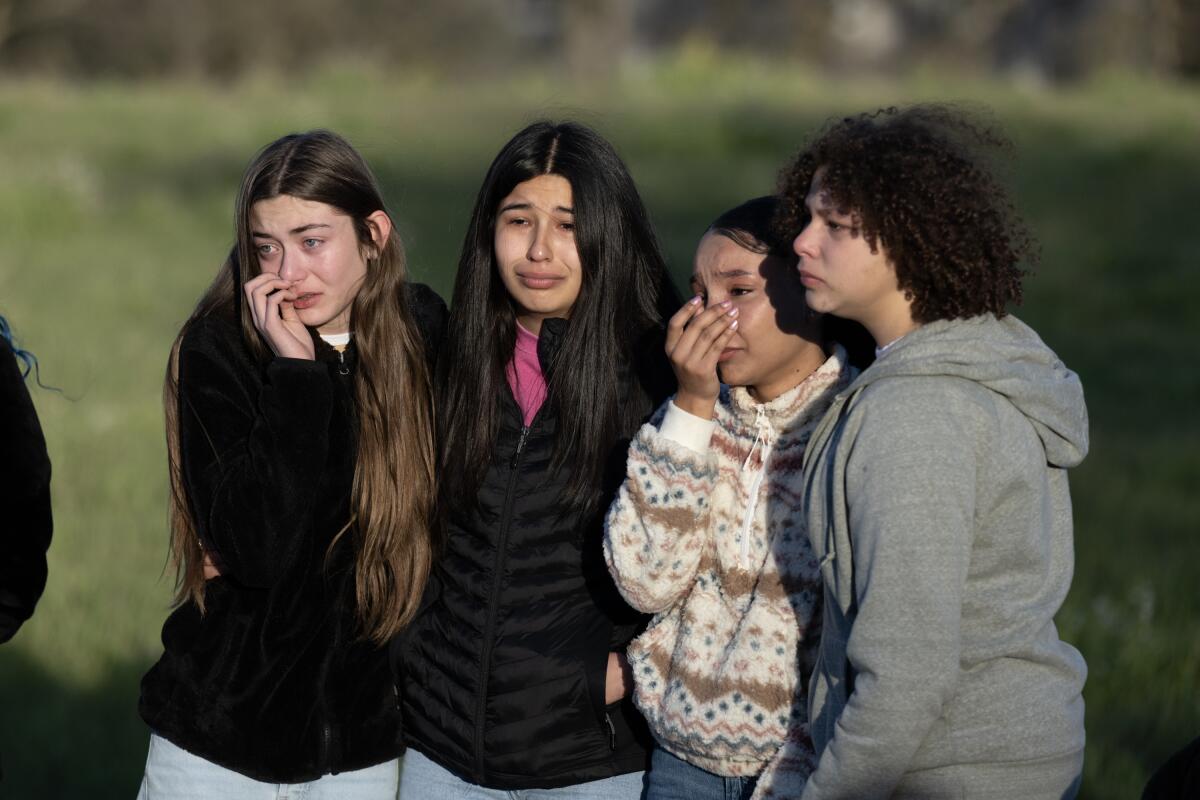
California does a terrible job preventing domestic violence and protecting victims from abuse once it has occurred. That is mostly because we don’t take it seriously. Gutiérrez is not the only proof. Last year, the state auditor examined intervention programs for domestic abusers and found “systemic failures,” from court oversight to probation monitoring. I checked in with some of those authorities and was told they’re working on changes, coming soon, but nothing yet. Just the kind of brush off the system is best at.
Because somehow putting “domestic” before “violence” makes us treat it as less deadly or harmful than a random attack by a stranger, though about three women are killed every day by an intimate acquaintance in the U.S. In the five years ending in 2022, the Trace, a news organization that investigates gun violence, found that at least 866 kids were shot in domestic violence incidents, a number that includes the Gutiérrez girls. Domestic violence is also strongly linked to mass shootings.
Chabria: Sacramento shooting suspects had a history of domestic violence. It’s a warning sign
Abuse of women often leads perpetrators to engage in gun violence. The link is strong, but our will to stop abusers is not.
Why, you may wonder, is domestic violence such an unchecked crisis when there are so many laws on the books? Those who work to stop domestic violence day in and day out know those laws are often applied haphazardly, and that those in charge of administering justice — judges, police, probation officers, district attorneys, even advocates — often have trouble keeping the rules straight, or even finding enough time in overburdened courts to try. Often, help comes down to what judge you get, what officer shows up to the door, or how well a district attorney understands the complexities of abuse and escaping from it.
Underneath it all remains the bias that women are lying or somehow complicit — or a shoulder-shrugging resignation that violence against women and children is inescapable, so entwined in our casually misogynistic culture that its destructive thread can’t be pulled from the fabric of society.
But it is not inevitable, state Assemblymember Reggie Jones-Sawyer told me.
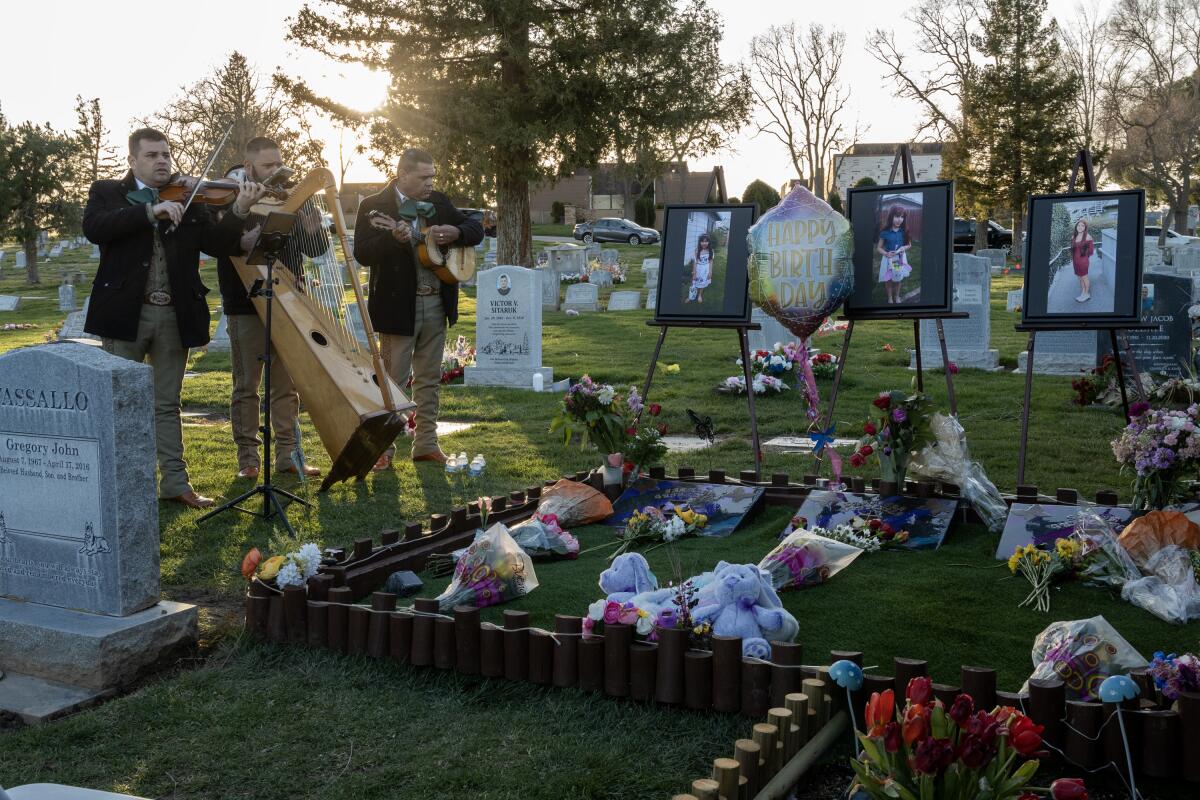
This year, Jones-Sawyer, a Los Angeles Democrat, is helping a coalition of organizations push the Legislature to include $50 million in the budget to prevent and end domestic and sexual violence, a much-needed boost in ongoing funding. Of that, $2 million would be used to create a single entity to oversee all of California’s efforts, instead of allowing half a dozen state departments and hundreds of local efforts to run without cohesion — a critical missing piece to fix a chaotic system.
If we do nothing else, we should demand the money, and that this leadership position be funded.
Jones-Sawyer knows firsthand that abusive behavior can be stopped. He knows because he used to be verbally abusive, he told me — learned behavior from his own childhood. An “ugly” divorce made him realize he “did a lot of screaming,” and he said that led him to change those destructive patterns he internalized as a kid.
It is to his great credit that he speaks about his past so openly, because it is a reminder that abuse hurts everyone involved, even the perpetrators. That doesn’t excuse their actions, but offers hope for breaking generational cycles.
“I realized that even verbal [abuse] can be as damaging and harmful as physical, and long lasting,” Jones-Sawyer said. “That is the insanity of domestic and sexual violence, that you don’t know it was poured into you” as a child.
He also knows that the system needs to do a far better job of protecting the many women trying to disentangle their lives from lethally abusive men who have no interest in changing.
Gutiérrez “did everything right,” Faith Whitmore, the head of the Sacramento Regional Family Justice Center, told me. Her organization helped Gutiérrez get a restraining order against Mora.
Gutiérrez told me Mora had for many of the 15 years they were together been volatile and possessive. He hated for her or the girls to socialize outside the narrow circle of their church, and was easily angered by any perceived wrong.
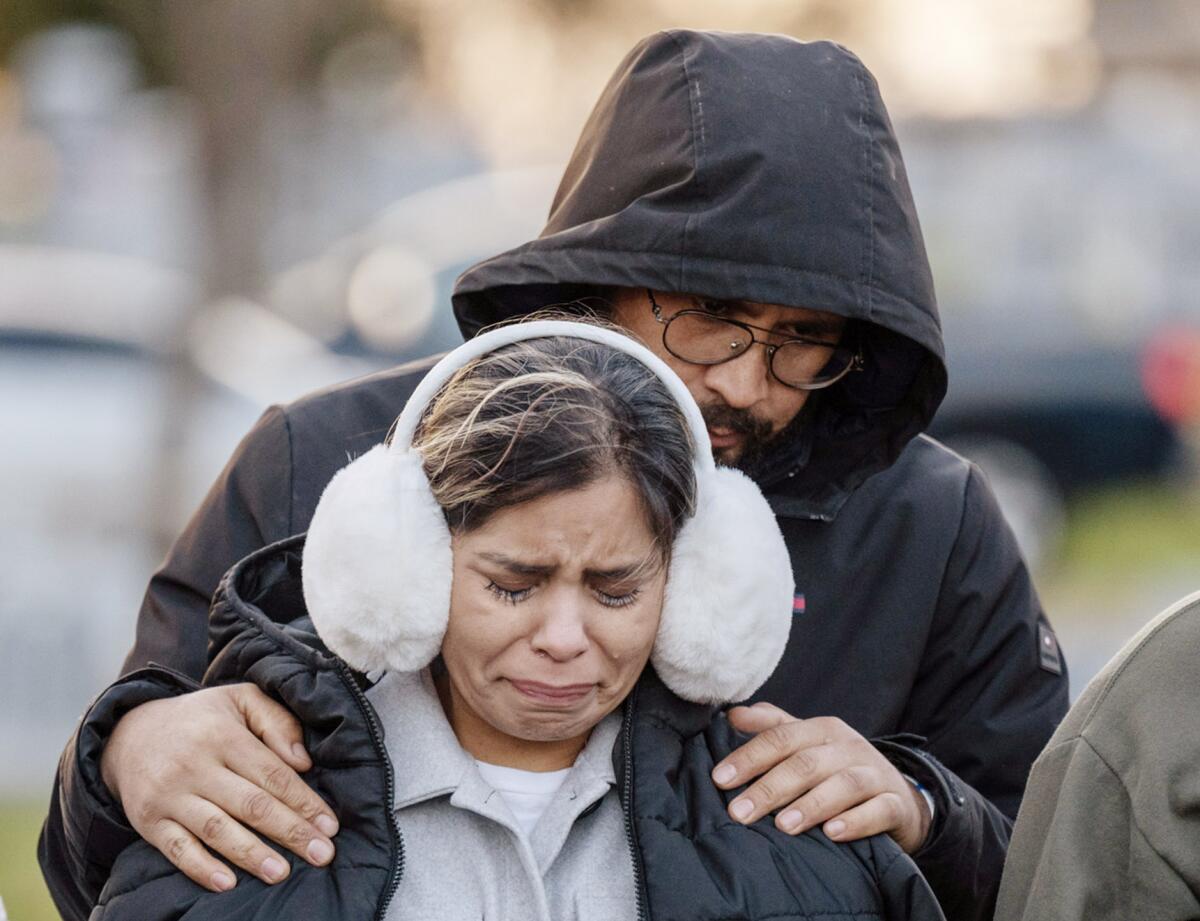
In the past, he had choked her — a massive red flag for later homicide attempts. Women who have experienced a strangulation attempt by an intimate partner are 750% more likely to be killed by that partner than those who have not been choked.
In April 2021, Mora became more violent toward her and “wouldn’t control himself in front of the kids,” she said. One day, he called her into the garage and said he was suicidal and wanted to admit himself into a hospital. He told her he didn’t want her to continue to work shucking tamales while he was gone, and when she said she needed to, he grew furious. He threw a ball at her and grabbed her hard enough to leave a bruise. The girls were scared and crying.
She called members of their church for help, and Mora left. A deeply faithful woman, Gutiérrez said she asked God for guidance and felt him speaking to her that this was her moment to leave. A woman from the church offered her home as a place to stay, and Gutiérrez and her daughters left.
Soon after, Gutiérrez received a call from a psychiatric hospital that Mora was there on an involuntary hold. Gutiérrez said the hospital staff recommended she file a police report, which she did despite fears about her immigration status, and that of the girls, who were also born in Mexico. Gutiérrez said sheriff’s deputies told her to try to get a restraining order.
Whitmore’s organization helped her fill out the paperwork, and the court approved a restraining order banning Mora from contact with Gutiérrez and the girls for five years. But Mora fought her efforts to keep him from any interaction with the kids, writing in court documents that “I want a healthy relationship with my children.”
Mora testified that he had been diagnosed with schizophrenia, Gutiérrez said. She testified she was afraid of him — and the restraining order cites the past strangulation attempt. But during court hearings, Gutiérrez said she felt frustrated and helpless “because you don’t know the law.”
At least two judicial commissioners, the equivalent of judges in family court — who should have seen the combined warnings of choking and serious mental illness — instead granted Mora visitations.
Whitmore said it’s common for judges to grant fathers time with kids even with a restraining order. Mora received four hours on weekends to be overseen not by a trained professional, but by a volunteer from their church. Mora also killed that man, Nathaniel Kong, when he fired 17 shots from a semiautomatic rifle, then fatally shot himself.
After the killings of children involved in custody battles, state Sen. Susan Rubio is pushing for a bill that would require judges receive domestic violence training.
Gutiérrez said that after the first two visits, the girls didn’t want to see their father anymore. “He wanted to know everything,” she said. “He would pressure them.” But she made them go, afraid of what the judge would do if she didn’t follow his orders.
Then, last year, days before Samantha’s birthday, the girls were late coming home from their visit. Gutiérrez could see from the location of Samia’s phone that they were still in church. But when she tried calling, there was no answer.
Worry turned to fear. A woman from the church called to ask whether she had seen the news. Gutiérrez called another church friend and asked him to go see what had happened.
What he told her ended life as she knew it.
Gutiérrez believes Mora killed their children as an act of vengeance against her. She feels rage that no one believed her when she said Mora was dangerous, that no one took her seriously enough to keep him away from the children until there was certainty that his mental illness was stabilized, that his violence was under control.
She wants to know whether there will ever be accountability for the judges. Sitting with her, I don’t have the courage to tell her it is unlikely.
During the investigation, it came out that Mora had been arrested in a nearby county days before the shooting and was out on bail on charges of resisting arrest, battery on a police officer and driving under the influence.
None of that was flagged, none of that stopped him.
“This case still haunts us,” Whitmore said.
It should haunt us all because the lost promise of the Gutiérrez girls is buried in the hard dirt, three little butterflies with their wings ripped off by our indifference.
As darkness fell at the memorial service, a video montage of the girls played on the wall of a white tent. The wind punched at its sides, warping the photos into blurry, distorted ghosts — riding bikes, laughing, fragile and innocent. Gutiérrez walked away. The sound of her crying echoes in my heart.
She wants people to remember what her daughters were like. Samia, the oldest, wanted to be an architect and design her own home. She loved to draw and paint, and had bright red hair that unexpectedly runs in Gutiérrez’s family.
Samantha was fierce, and loved defending her ideas. She wasn’t afraid to stand up for herself, or others. She had the red hair too.
Samarah, the baby, had a shy smile. She loved to help people — her classmates, her teachers. Every night, after Gutiérrez tucked her in with a prayer, Samarah would come into her mom’s room to give her that same blessing, that same comfort before they closed their eyes.
Somehow, Gutiérrez still has her faith. She believes that God has a purpose for everyone and that this happened to her daughters “so it doesn’t happen to other people.”
My faith is more frail. I fear it will happen again.
Because we let it. Because killing a loved one is somehow different from killing a stranger.
- Share via
Watch L.A. Times Today at 7 p.m. on Spectrum News 1 on Channel 1 or live stream on the Spectrum News App. Palos Verdes Peninsula and Orange County viewers can watch on Cox Systems on channel 99.
More to Read
Sign up for Essential California
The most important California stories and recommendations in your inbox every morning.
You may occasionally receive promotional content from the Los Angeles Times.

